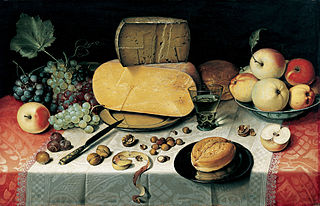 W
WA banquet is a formal large meal or feast, where a number of people consume food together. Banquets are traditionally held to enhance the prestige of a host, or reinforce social bonds among joint contributors. Modern examples of these purposes include a charitable gathering, a ceremony, or a celebration. They often involve speeches in honor of the topic or guest of honour.
 W
WBarbecue or barbeque is a cooking method, a cooking device, a style of food, and a name for a meal or gathering at which this style of food is cooked and served.
 W
WA boodle fight, in the context of Filipino culture, is the military practice of eating a meal.
 W
WA buffet is a system of serving meals in which food is placed in a public area where the diners serve themselves. A form of service à la française, buffets are offered at various places including hotels, restaurants, and many social events. Buffet restaurants normally offer all-you-can-eat food for a set price, but some measure prices by weight or by number of dishes. Buffets usually have some hot dishes, so the term cold buffet has been developed to describe formats lacking hot food. Hot or cold buffets usually involve dishware and utensils, but a finger buffet is an array of foods that are designed to be small and easily consumed only by hand, such as cupcakes, slices of pizza, foods on cocktail sticks, etc.
 W
WBurns Clubs exist throughout the world to encourage and cherish the memory of Robert Burns, to foster a love of his writings and generally to encourage an interest in the Scots Language and Literature. An emphasis on encouraging the young to take an interest in Burns is found in most clubs through poetry, singing and other competitions. Once mainly existing as 'male only' clubs in the mould of the Tarbolton 'Batchelor's Club' most now welcome women as fellow members. Ladies Burns Clubs also exist such as the 'Irvine Lasses' that was established in 1975; it has appointed several male 'Honorary Lasses'.
 W
WA chocolataire is a type of social gathering which ranges from large events to smaller functions, in which all food and drink are composed of or contain some form of chocolate. Considered obsolete by some, this entertainment was at its peak popularity around the turn of the 20th century, and was seen as a novel alternative to the other forms of social gathering at the time.
 W
WThe clambake or clam bake, also known as the New England clambake, is a traditional method of cooking seafood, such as lobster, mussels, crabs, soft-shell clams, and quahogs. The food is traditionally cooked by steaming the ingredients over layers of seaweed. The shellfish can be supplemented with vegetables, such as onions, carrots, and corn on the cob. Clambakes are usually held on festive occasions along the coast of New England.
 W
WA cocktail dress is a dress suitable at semi-formal occasions, sometimes called cocktail parties, usually in the late afternoon, and usually with accessories.
 W
WA cocktail party is a party at which cocktails are served. It is sometimes called a cocktail reception. A cocktail party organized for purposes of social or business networking is called a mixer.
 W
WA commercium is a traditional academic feast known at universities in most Central and Northern European countries. In German it is called a Kommers or Commers. Today it is still organised by student fraternities in Germanic and Baltic countries, as well as Poland.
 W
WA communal meal is a meal eaten by a group of people that serves a social and/or ceremonial purpose.
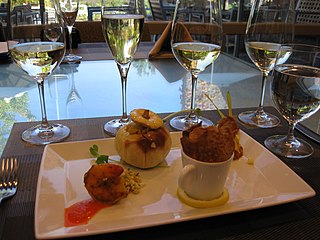 W
WDégustation is the careful, appreciative tasting of various food, focusing on the gustatory system, the senses, high culinary art and good company. Dégustation is more likely to involve sampling small portions of all of a chef's signature dishes in one sitting. Usually consisting of eight or more courses, it may be accompanied by a matching wine degustation which complements each dish.
 W
WDîner en Blanc is a worldwide event spanning six continents in which people have a meal dressed in white in a temporary dining setup in a public space. Diners are required to provide their own food, tables, chairs and tablecloths. Only a select number of participants who have previously signed up are made privy to the location the day of the dinner, and generally converge in an iconic urban location.
 W
WDinner under the Helsinki sky is an event where people gather for a picnic dinner outside into an urban public spaces for example in yards, parks, sidewalks or squares.
 W
WFood swaps are events where members of a local community meet up to share homemade, homegrown, and foraged foods with each other. Apart from diversifying their larders and redistributing surpluses and gluts, they provide opportunities for building stronger communities, and picking up tips. No money changes hands. Attendees bring items that they wish to swap and then bid for each other's produce, either verbally or on cards in the form of a silent auction, until suitable swaps are negotiated. Often attendees bring extra items either as free samples or as contributions to a potluck lunch or tea, so that there is more time to get to know each other, exchange gossip and pass on tips.
 W
WA tea party is a gathering for the small meal called afternoon tea.
 W
WA lūʻau is a traditional Hawaiian party or feast that is usually accompanied by entertainment. It may feature food such as poi, kālua puaʻa, poke, lomi salmon, ʻopihi, and haupia, beer, and entertainment such as traditional Hawaiian music and hula. Among people from Hawaiʻi, the concepts of "lūʻau" and "party" are often blended, resulting in graduation lūʻaus, wedding lūʻaus, baby lūʻaus, and birthday lūʻaus.
 W
WMangal is a Middle Eastern barbecue—both the event and the grilling apparatus itself.
 W
WIn indigenous communities of the Ecuadorian highlands, a pampa mesa or pamba mesa is a communal meal of food laid directly on a cloth spread on the ground. The meal is seen as an act of social solidarity; it also has mythological connotations.
 W
WA picnic is a meal taken outdoors as part of an excursion – ideally in scenic surroundings, such as a park, lakeside, or other place affording an interesting view, or else in conjunction with a public event such as preceding an open-air theater performance, and usually in summer.
 W
WA pig pickin' is a type of party or gathering held primarily in the American South which involves the barbecuing of a whole hog. Females, or gilts, are used as well. Boars and sows generally are too large.
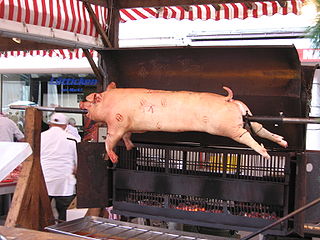 W
WA pig roast or hog roast is an event or gathering which involves the barbecuing of a whole pig.
 W
WA potlatch is a gift-giving feast practiced by Indigenous Peoples of the Pacific Northwest Coast of Canada and the United States, among whom it is traditionally the primary governmental institution, legislative body, and economic system. This includes the Heiltsuk, Haida, Nuxalk, Tlingit, Makah, Tsimshian, Nuu-chah-nulth, Kwakwaka'wakw, and Coast Salish cultures. Potlatches are also a common feature of the peoples of the Interior and of the Subarctic adjoining the Northwest Coast, although mostly without the elaborate ritual and gift-giving economy of the coastal peoples.
 W
WA potluck is a communal gathering where each guest or group contributes a different, often homemade dish of food to be shared.
 W
WSadhya is a feast of Kerala origin and of importance to all Malayalis, consisting of a variety of traditional vegetarian dishes usually served on a banana leaf in Kerala as lunch. Sadhya means banquet in Malayalam. Sadhya is typically served as a traditional dish for Onam, the state festival of Kerala.
 W
WSatuditha is a traditional Burmese feast and merit-making activity that features prominently in Burmese culture, reinforcing the importance of generosity and almsgiving as a Burmese cultural norm.
 W
WA Schlachtfest is the German term for the ritual or ceremonial slaughter of an animal, which is often followed by feast. Today, it usually refers to the practice in many parts of Germany, such as the Palatinate, for a celebration or festival involving the ceremonial slaughter of a pig reared or bought by a private household or an inn for that purpose.
 W
WSeafood boil is the generic term for any number of types of social events in which shellfish, whether saltwater or freshwater, is the central element. Regional variations dictate the kinds of seafood, the accompaniments and side dishes, and the preparation techniques. In some cases, a boil may be sponsored by a community organization as a fund-raiser or a mixer. In this way, seafood boils are like a fish fry, barbecue, or church potluck supper. Boils are also held by individuals for their friends and family for a weekend get-together and on the holidays of Memorial Day and Independence Day. While boils and bakes are traditionally associated with coastal regions of the United States, there are exceptions.
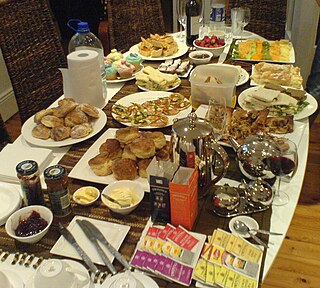 W
WSmörgåsbord is a type of Scandinavian meal, originating in Sweden, served buffet-style with multiple hot and cold dishes of various foods on a table.
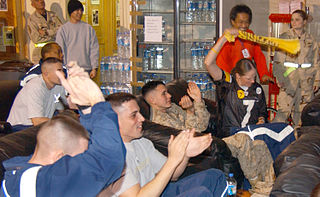 W
WSuper Bowl Sunday is the day on which the Super Bowl, the National Football League (NFL)'s annual championship game, is played. It is usually observed on the first Sunday in February and is sometimes referred to as an unofficial national holiday. The 54th annual event, Super Bowl LIV, occurred on February 2, 2020. Festivities for Super Sunday typically involve groups of people gathering to watch the game. Both "Super Sunday" and "Super Bowl Sunday" are registered trademarks of the National Football League. On Guam, it is known as Super Bowl Monday, due to the time zone, the game airs live Monday morning.
 W
WA supra is a traditional Georgian feast and a part of Georgian social culture. There are two types of supra: a festive supra, called a keipi, and a sombre supra, called a kelekhi, that is always held after burials.
 W
WA tailgate party is a social event held on and around the open tailgate of a vehicle. Tailgating, which primarily takes place in the United States, often involves consuming alcoholic beverages and grilling food. Tailgate parties occur in the parking lots at stadiums and arenas, before and occasionally after games and concerts. People attending such a party are said to be 'tailgating'. Many people participate even if their vehicles do not have tailgates. Tailgate parties also involve people bringing their own alcoholic beverages, barbecues, food etc. which is sampled and shared among fans attending the tailgate. Tailgates are intended to be non-commercial events, so selling items to the fans is frowned upon. Tailgating is often seen as a critical part of the sports experience in the United States. Because many American sports venues are surrounded by large parking lots, tailgating often takes place right outside stadium and arena entrances.
 W
WA tea party is a gathering for the small meal called afternoon tea.
 W
WTheenmura also spelt Theen Mura is the traditional banquet of Saint Thomas Christians of Kerala, India. It is a non-vegetarian form of festive main meal and significantly differs from the vegetarian banquet Sadhya in dishes and course of serving. It is typically served in Christian festivals such as Christmas, Easter, Nalpiravi, Pindikuthi Perunnal, Dukrana and family occasions of Christians such as Marriage, Baptism, First Communion and Engagement.
 W
WYule or Yuletide is a festival historically observed by the Germanic peoples. Scholars have connected the original celebrations of Yule to the Wild Hunt, the god Odin, and the pagan Anglo-Saxon Mōdraniht.